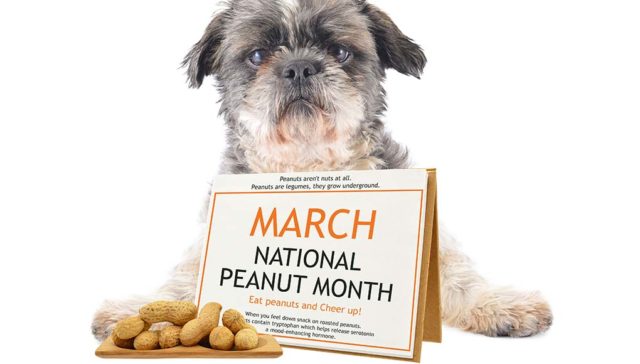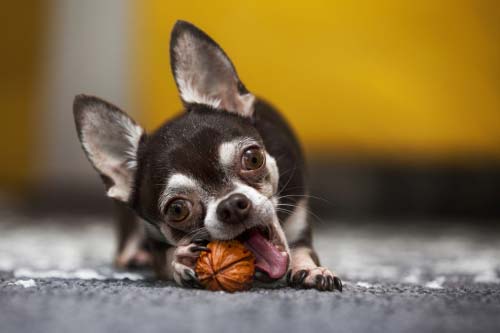
Table of Contents
If you follow our home-cooked dog food recipes here on Top Dog Tips, you've noticed that sometimes we include nuts in the ingredients list. But aren’t nuts toxic to dogs and shouldn't they be avoided? Yes, some nuts are indeed dangerous to dogs, while a few others are perfectly fine to feed your canine companion.
Why Are Nuts Controversial?
Some nuts like peanuts and chestnuts pose no toxicity dangers to dogs and can be fed as an occasional treat in small amounts. Other nuts like macadamia, pistachios, and walnuts are highly toxic to dogs and should be avoided at all costs. Certain types like almonds, are not toxic but can only be fed in very small amounts.
When it comes to using nuts in homemade dog food recipes, it's best to use only a minimal amount. Other than toxicity, in large doses (especially for small breeds), some nuts can also pose a choking hazard or become lodged in the intestines, creating an obstruction/blockage.
Safe Nuts for Dogs
Generally, there are only two types of nuts that are safe to feed to dogs and reap some of their benefits – peanuts and roasted chestnuts.
Peanuts. A few raw or roasted, unsalted peanuts can be included in homemade dog food recipes and they will not harm a healthy adult dog. Never feed peanuts that are covered in chocolate or coated with sugar, candy or other additions.
Roasted Chestnuts. Similar to peanuts, chestnuts are high in fat. In small quantities given to healthy adult dogs, they are fine. Stick to feeding them only on occasion.
Non-toxic Nuts but Better Avoided
Some other nut types are not poisonous to dogs but may pose other risks. They will be fine in very small amounts, given rarely, but generally, it's better to avoid them and stick with safer nuts mentioned above.
Almonds. This nut is not toxic to canines, but dogs tend to have a difficult time digesting the almond. This can sometimes lead to GI upset.
Hazelnuts. Also not toxic to dogs, but due to their shape and size, they can cause choking or intestinal blockage, especially in small breeds.
Roasted or Baked Cashews. These are very high in potassium and can pose a risk to dogs with urinary issues.

Toxic Nuts for Dogs
A large number of nut types are dangerous to dogs and should never be used in home cooked dog food recipes, or given as treats.
Walnuts (Black, English & Japanese). Other than regular raw or roasted walnuts, moldy walnuts especially are toxic to dogs because they can contain a fungus called tremorgenic mycotoxins. This can cause seizures and other dangerous neurological complications in pets.
Pistachios. This nut can carry aspergillus mold which produces aflatoxin that can affect the dog’s liver. Pistachios's shape and size are also a choking hazard and can block your pup's intestines.
Macadamia Nuts. This is a highly toxic nut to dogs, and even one nut can cause severe diarrhea, vomiting, weakness in the legs, fever, and shivering.
Pine Nuts. They can cause GI upset in dogs, and large doses can severely affect your dog’s pancreas and urinary tract.
Pecans. Similar to pistachios, pecans also contain aflatoxin which can damage the dog's liver. Pecans also contain a compound called juglone, which is toxic to both the canine and equine species.
Brazil Nuts. They are not toxic per se, but Brazil nuts are very high in fat and can, over time, create pancreatitis in dogs.
Using Safe Amounts of Nuts in Homemade Dog Food
When it comes to using nuts in homemade dog food meals, none of my recipes of mine, or those developed by holistic veterinarians, use large amounts of them. I also rarely include them in recipes, and only to spice up a pet's diet with some of the benefits that safe nuts like peanuts provide.
If you choose to feed your dog peanuts or roasted chestnuts more often, it is recommended to use only extremely small on occasion as a treat or added to the recipe. This dosage is likely to be safe for healthy adult dogs and will allow you to reap some of the health benefits nuts can provide to your dog.
In general, I would also recommend sticking to organic, natural peanut butter, which dogs will love and it's going to be completely safe. Many of my home-cooked dog food recipes include peanut butter in both meals and treats, such as this one, this, this, and this.
Be Mindful of Existing Health Conditions
Even when feeding safe nuts to dogs, you need to stay vigilant. Just like with any recipe or ingredient, drug, or even commercial kibble, observe your pet for any signs of sensitivities when feeding nuts.
Be mindful that when using nuts like peanuts and chestnuts, the above recommendation is for healthy adult dogs only, and those that do not suffer from certain conditions. In some cases, even safe nuts may be more dangerous.
- Sensitive Stomachs. Due to makeup of the peanut, dogs with sensitive stomachs should not be fed any nuts.
- Urinary Tract Issues. Any type of nuts can make this issue worse.
- Pancreatitis. All nuts are high in fat. Dogs with pancreas problems should avoid eating nuts, even if they're considered safe in small doses.
- Small Dogs. Whole nuts can pose a choking problem and/or an intestinal obstruction for smaller dogs.
- Obese Dogs. All nuts are high in fat, and dogs that are overweight should not be given nuts at all.
Consult with a holistic veterinarian before you begin including nuts in your homemade dog food recipes. When using safe nuts (or peanut butter), start slowly to avoid stomach upset and never exceed the recommended “dose” for your dog’s weight.
Note: Never feed your dog nuts that have gone moldy or those that are covered in chocolate or sugar, or those still in the shell.
Potential Benefits of Nuts for Dogs
As with any fruit or vegetable, there's been a huge amount of studies done on the benefits of nuts in humans, some of which can extend to dogs. Below are some of the benefits that the most popular dog-friendly nuts – peanuts – may provide.
In ¼ cup (36.5 grams) of peanuts, you'll find:
- 47% Copper – 47%
- 36% Manganese
- 28 % Vitamin B3
- 24% Molybdenum
- 22% Folate
- 21% Biotin
- 20% Phosphorus
- 20% Vitamin E
- 19% Protein
- 19% Vitamin B1
- 7% Potassium
- 19 grams of Fat
Heart Health – Due to the high levels of monounsaturated and polyunsaturated fats in the peanut, it can promote good heart health and decrease the chances of cardiovascular disease in your dog.
Promotes Healthy Skin and Coat – Peanuts are naturally high in Biotin (vitamin B7) which helps keep the coat shiny and in good condition.
Lower Cholesterol – Peanuts contain high levels of Niacin which has been known to help lower bad cholesterol.
Boost of Protein – Peanuts contain a significant amount of protein, which will improve your dog’s energy levels, muscle tone, and brain function.
READ NEXT: 16 Healthy Human Foods for Dogs (That You Haven’t Thought Of)
Want to share this?












